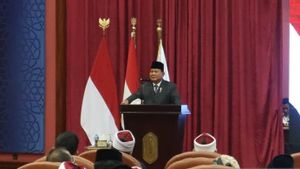JAKARTA - Billionaire and entrepreneur Elon Musk said that his brain chip startup company, Neuralink, plans to start trials on its first human being this year. Musk made this statement at the VivaTech event in Paris, France, which was monitored by Reuters.
Neuralink plans to transplant patients suffering from tetraplegia or paraplegia in a webcast. Although Musk did not mention how many patients his company would plan or for how long, he said that "the first possible case will take later this year."
Last month, Neuralink announced that it had obtained approval from the United States Food and Drug Administration (FDA) to conduct its first human clinical trials.
This is an important milestone for the company, especially as it is facing an investigation by US authorities regarding the handling of experiments on animals. The FDA acknowledged in a previous statement to Reuters that it granted Neuralink permission to use its brain implants and surgical robots in the trial, but did not provide more details.
If Neuralink can prove that its device is safe to use in humans, it could still take several years or maybe even more than a decade, for this startup to obtain a commercial use permit. It also means that Neuralink must compete with other neurotech companies that have succeeded in installing their devices on humans.
Musk has previously missed a deadline in his public statement about Neuralink. At least four times since 2019, Musk has predicted that Neuralink will soon begin human trials.
Neuralink, which was founded in 2016, first submitted an application to the FDA in early 2022, but her petition was rejected due to dozens of safety concerns. Some of these issues relate to device lithium batteries, the possibility of implantable cable migration within the brain, and the challenges of safely removing the device without damaging brain tissue.
Neuralink is also facing a federal government investigation following a Reuters report on experiments on animals carried out by the company.
Last year, Neuralink employees revealed that the company was in a hurry and made an error in operations on monkeys, pigs, and sheep, leading to more animal deaths than it should have been, due to Musk's insistence on obtaining FDA approval. Experiments on these animals are expected to produce data that supports the company's app for human trials.
One example is that in 2021, the company will install 25 out of 60 pigs with devices that are not suitable in size. All pigs are then killed, a mistake that can be avoided with better preparation, according to employees who say that this can be done better.
In May, US lawmakers urged regulators to investigate whether the membership of the Neuralink panel overseeing animal testing contributed to a hasty and failed experiment following a Reuters report on potential financial conflicts of interest within the panel.
The Department of Transportation is also investigating whether Neuralink illegally transports dangerous pathogens on chips taken from the monkey's brain without adequate security measures. The agency's spokesman said on Friday, June 16 that the investigation was still ongoing.
Neuralink is also being investigated by the United States Department of Agriculture's Inspector General's Office regarding potential animal welfare abuses. The investigation highlights the Ministry of Agriculture's surveillance of Neuralink. The agency's spokesman has not yet responded to a request for comment.
Meanwhile, the valuation of Neuralink's company has increased rapidly in recent months. The startup has a value of about US$2 billion (Rp29.5 trillion) in a private funding round two years ago and now has a value of about US$5 billion (Tp74.6 trillion) based on private stock transactions, as reported by Reuters this month.
Neuralink employees who are members of the company's animal council, which are being investigated by the federal government over financial conflicts of interest, have the potential to benefit from the rapid development of these implants. Neuralink shares owned by some employees have increased by about 150% in the past two years, based on secondary transactions, as reported by Reuters.
The English, Chinese, Japanese, Arabic, and French versions are automatically generated by the AI. So there may still be inaccuracies in translating, please always see Indonesian as our main language. (system supported by DigitalSiber.id)













